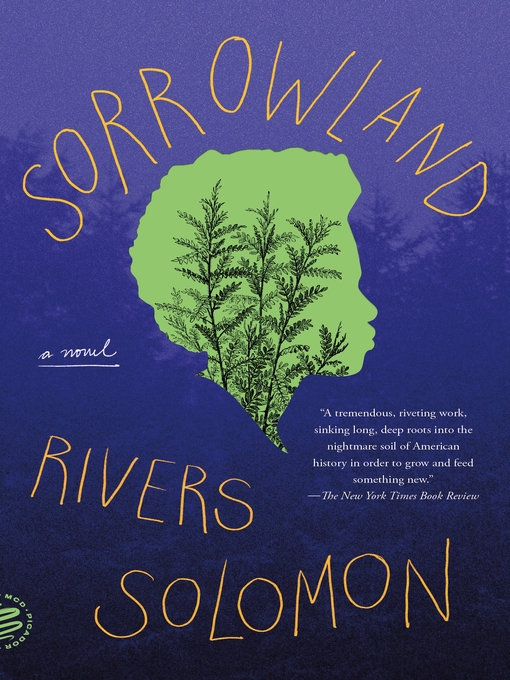Review by Booklist Review
Vern is fifteen and pregnant when she escapes from the compound of the Blessed Acres of Cain into the surrounding forest. She gives birth while being hunted by someone--or something--that seems able to locate her with uncanny ease, but manages to remain free. With her twins, Howling and Feral, Vern survives in the woods for years as her body hardens and strengthens far beyond human limitations, though she is also haunted by visions of Cainites past and present. When the hunter resurfaces, the small family is forced to follow a long-cold trail through unknown territory toward someone from Vern's past. Even as they navigate the new wilderness of highways, strangers, and capitalism to find a safe haven, Vern's body continues its slow and painful transformation into a wondrous armored form, capable of amazing feats. With the aid of new allies and an understanding of the truth behind the Blessed Acres of Cain, Vern must confront those responsible for concocting a twisted science experiment in the guise of a religious Black nationalist enclave. Solomon once again stretches the boundaries of speculative fiction in this distinct and visceral exploration of the trauma of Black and queer bodies in an all-too believable near future.
From Booklist, Copyright (c) American Library Association. Used with permission.
Review by Publisher's Weekly Review
Solomon's outstanding third novel (after The Deep) revisits the themes of memory and responsibility through two new lenses: horror and contemporary thriller. Vern, an albino, intersex, Black child raised in a cult known as the Blessed Acres of Cain, flees to the woods as a seven-months-pregnant 15-year-old, giving birth to twins she names Howling and Feral. The new family is pursued by "the fiend," who appears to the nearly blind Vern as "a white blur." The fiend scatters animal carcasses throughout the woods (often pointedly targeting animal families to send a message to Vern and her children) and sets dangerous fires. For four years Vern raises her twins without other human contact, until a cataclysmic encounter with the fiend, fearsome changes in her own body, and relentless hauntings drive her to seek answers in the world outside the woods. This plot is the most accessible of Solomon's work to date, but they use the deceptively simple story to delve deep into Vern's struggle to forge her own identity without buckling under the weight of history. As in their debut, An Unkindness of Ghosts, Solomon often packs so much into each image that the result can be overwhelming. They display a maturing control of their craft, employing a breathtaking range of reference that will enable any reader, from horror geek to Derridean academic, to engage with this thrilling tale. This is a tour de force. Agent: Seth Fishman, the Gernert Co. (May)
(c) Copyright PWxyz, LLC. All rights reserved
Review by Library Journal Review
Vern lives in the woods, isolated from society and determined to raise her twins far from its baleful influence. But now her body is undergoing strange transformations, and she looks back aghast at a religious compound she fled, where society's marginalized were subjected to dehumanizing treatment and medical experimentation. From the author of The Deep, a collaborative novella that was a finalist for the Hugo, Nebula, Locus, and Lambda Literary Awards.
(c) Copyright Library Journals LLC, a wholly owned subsidiary of Media Source, Inc. No redistribution permitted.
Review by Kirkus Book Review
A Lambda Award--winning writer explores America's dark history of brutalizing Black bodies in their latest work of speculative fiction. Vern is a young woman raising her twin babies in a forest, dressing them in the hides of animals she's hunted and hiding them away in makeshift shelters. Vern is being followed by ghosts and stalked by someone who butchers animals and dresses them in infants' clothes. Both are connected to the Black separatist commune from which Vern has escaped. As a parasite takes over her body, Vern develops superhuman powers and begins to suspect that she is a test subject being used by the United States government. There's a lot going on here--perhaps too much. The novel starts out strong; the portion of the narrative in which Vern and her children are fending for themselves in the wilderness has the feel of folklore, and the idea that she is haunted by the experience of her ancestors is evocative. As Solomon moves further into the realms of science fiction, though, their voice loses much of its force. This is surprising given the quality of the worldbuilding in An Unkindness of Ghosts (2017), a dystopian tale set on a giant spaceship. The problem isn't that the notion that Vern is part of a secret experiment conducted on Black people is implausible--Solomon references both the Tuskegee Study and the work of James Marion Sims, a 19th-century gynecologist who practiced new techniques on enslaved women. The problem is that the concept that drives the plot for half the novel is barely developed. With almost no evidence, Vern intuits that she is part of a shocking conspiracy, and, from that point, readers are supposed to take this as a given. Instead of building a compelling case, Solomon wrestles fantastic tropes into shapes that fit the frame they've created without effectively supporting it. The fictional universe Solomon constructs here is inadequate to the real-world issues they are exploring. Copyright (c) Kirkus Reviews, used with permission.
Copyright (c) Kirkus Reviews, used with permission.


